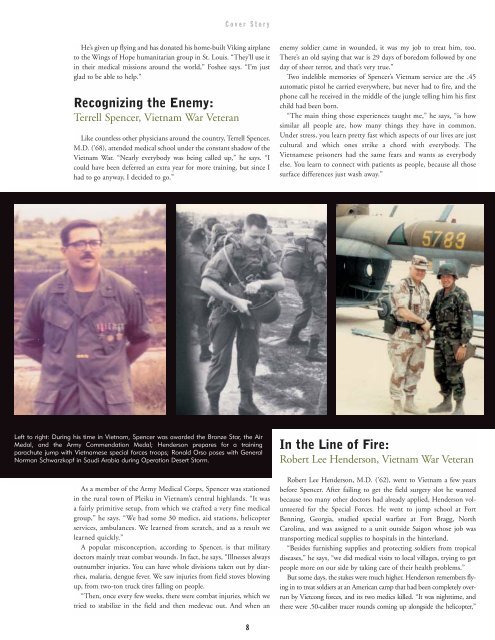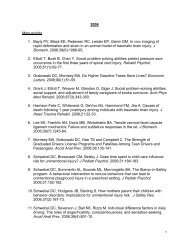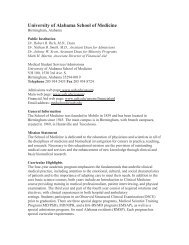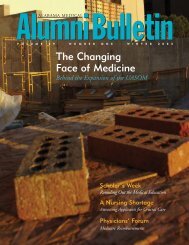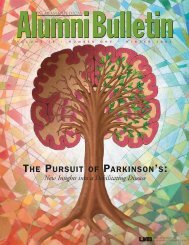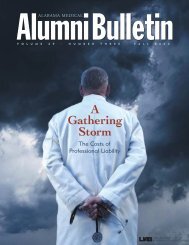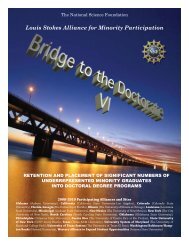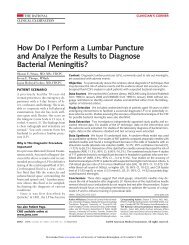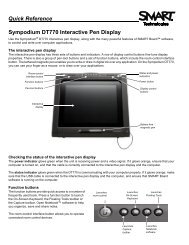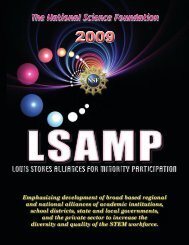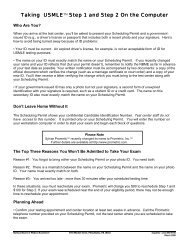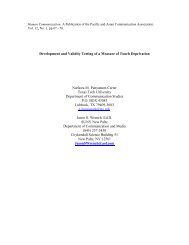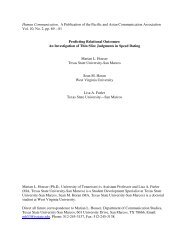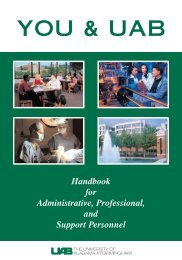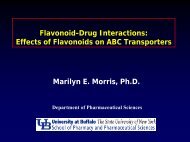uasom doctors uasom doctors - University of Alabama at Birmingham
uasom doctors uasom doctors - University of Alabama at Birmingham
uasom doctors uasom doctors - University of Alabama at Birmingham
Create successful ePaper yourself
Turn your PDF publications into a flip-book with our unique Google optimized e-Paper software.
Cover Story<br />
He’s given up flying and has don<strong>at</strong>ed his home-built Viking airplane<br />
to the Wings <strong>of</strong> Hope humanitarian group in St. Louis. “They’ll use it<br />
in their medical missions around the world,” Foshee says. “I’m just<br />
glad to be able to help.”<br />
Recognizing the Enemy:<br />
Terrell Spencer, Vietnam War Veteran<br />
Like countless other physicians around the country, Terrell Spencer,<br />
M.D. (’68), <strong>at</strong>tended medical school under the constant shadow <strong>of</strong> the<br />
Vietnam War. “Nearly everybody was being called up,” he says. “I<br />
could have been deferred an extra year for more training, but since I<br />
had to go anyway, I decided to go.”<br />
enemy soldier came in wounded, it was my job to tre<strong>at</strong> him, too.<br />
There’s an old saying th<strong>at</strong> war is 29 days <strong>of</strong> boredom followed by one<br />
day <strong>of</strong> sheer terror, and th<strong>at</strong>’s very true.”<br />
Two indelible memories <strong>of</strong> Spencer’s Vietnam service are the .45<br />
autom<strong>at</strong>ic pistol he carried everywhere, but never had to fire, and the<br />
phone call he received in the middle <strong>of</strong> the jungle telling him his first<br />
child had been born.<br />
“The main thing those experiences taught me,” he says, “is how<br />
similar all people are, how many things they have in common.<br />
Under stress, you learn pretty fast which aspects <strong>of</strong> our lives are just<br />
cultural and which ones strike a chord with everybody. The<br />
Vietnamese prisoners had the same fears and wants as everybody<br />
else. You learn to connect with p<strong>at</strong>ients as people, because all those<br />
surface differences just wash away.”<br />
Left to right: During his time in Vietnam, Spencer was awarded the Bronze Star, the Air<br />
Medal, and the Army Commend<strong>at</strong>ion Medal; Henderson prepares for a training<br />
parachute jump with Vietnamese special forces troops; Ronald Orso poses with General<br />
Norman Schwarzkopf in Saudi Arabia during Oper<strong>at</strong>ion Desert Storm.<br />
As a member <strong>of</strong> the Army Medical Corps, Spencer was st<strong>at</strong>ioned<br />
in the rural town <strong>of</strong> Pleiku in Vietnam’s central highlands. “It was<br />
a fairly primitive setup, from which we crafted a very fine medical<br />
group,” he says. “We had some 30 medics, aid st<strong>at</strong>ions, helicopter<br />
services, ambulances. We learned from scr<strong>at</strong>ch, and as a result we<br />
learned quickly.”<br />
A popular misconception, according to Spencer, is th<strong>at</strong> military<br />
<strong>doctors</strong> mainly tre<strong>at</strong> comb<strong>at</strong> wounds. In fact, he says, “Illnesses always<br />
outnumber injuries. You can have whole divisions taken out by diarrhea,<br />
malaria, dengue fever. We saw injuries from field stoves blowing<br />
up, from two-ton truck tires falling on people.<br />
“Then, once every few weeks, there were comb<strong>at</strong> injuries, which we<br />
tried to stabilize in the field and then medevac out. And when an<br />
In the Line <strong>of</strong> Fire:<br />
Robert Lee Henderson, Vietnam War Veteran<br />
Robert Lee Henderson, M.D. (’62), went to Vietnam a few years<br />
before Spencer. After failing to get the field surgery slot he wanted<br />
because too many other <strong>doctors</strong> had already applied, Henderson volunteered<br />
for the Special Forces. He went to jump school <strong>at</strong> Fort<br />
Benning, Georgia, studied special warfare <strong>at</strong> Fort Bragg, North<br />
Carolina, and was assigned to a unit outside Saigon whose job was<br />
transporting medical supplies to hospitals in the hinterland.<br />
“Besides furnishing supplies and protecting soldiers from tropical<br />
diseases,” he says, “we did medical visits to local villages, trying to get<br />
people more on our side by taking care <strong>of</strong> their health problems.”<br />
But some days, the stakes were much higher. Henderson remembers flying<br />
in to tre<strong>at</strong> soldiers <strong>at</strong> an American camp th<strong>at</strong> had been completely overrun<br />
by Vietcong forces, and its two medics killed. “It was nighttime, and<br />
there were .50-caliber tracer rounds coming up alongside the helicopter,”<br />
8


